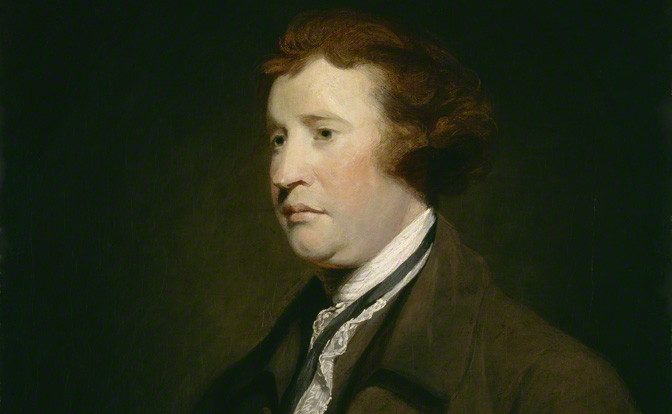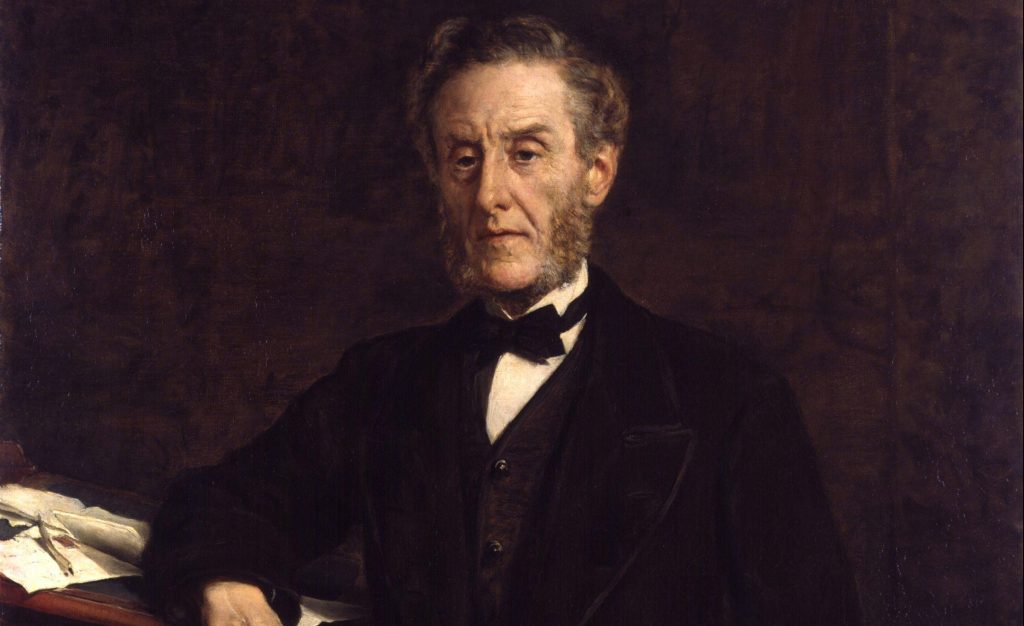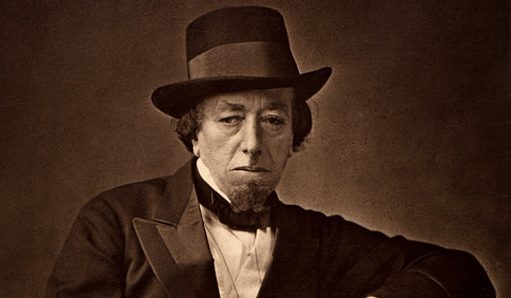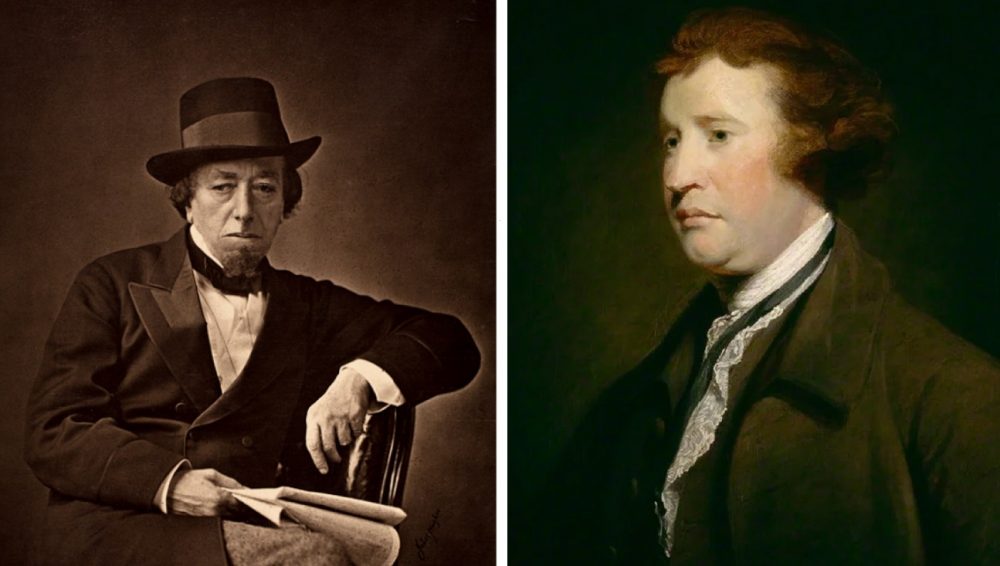When former justice minister Phillip Lee resigned ahead of the Brexit vote he called on his colleagues to “reclaim the party of Shaftesbury and Disraeli.” But just who are these historical figures, and what have they got to do with our rights?
Lee resigned at the Bright Blue conference ‘Fighting for Freedom’, an event which discussed how centre-right conservatives can support human rights. Conservatives, he argued, have been instrumental to the development of human rights. “So,” he said, “it upsets me that the Conservative Party and human rights are rarely connected in the public consciousness except in a negative way.”
Whether or not Lee is correct about public perceptions, his argument points to the importance of rights across the political spectrum. People from diverse political backgrounds have a stake in protecting the rights their predecessors helped create.
Edmund Burke

Image: National Portrait Gallery / Wikimedia Commons
Edmund Burke (1730-1797) was an Irish political philosopher and is often regarded as the father of modern conservatism. Burke was writing during the time of French Revolution, which he strongly opposed. For Burke, law and liberty are protected through national tradition which is disrupted by revolution.
It is not what a lawyer tells me I may do; but what humanity, reason, and justice tell me I ought to do.
Edmund Burke
Burke believed that rights are inherited, passed down through the framework of citizenship and government. Because of this, Burke’s ideas are sometimes presented as a critique of human rights – which many regard as rights we inherently possess. While Burke didn’t dispute this existence of “natural,” or inherent, rights, he argued that they were only meaningful within the context of social institutions.
However, Burke was also a fierce defendant of fundamental values that our human rights enshrine today, such as liberty and responsible government. He was also often willing to stand up for unpopular causes such as Catholic emancipation in Ireland and peace in the American colonies before the revolution.
While Burke’s relationship to human rights is complicated, his contribution to many of the values they protect is hard to deny.
Lord Shaftesbury

Image: Wikimedia Commons
Anthony Ashley Cooper, 7th Earl of Shaftesbury (1801-1885) was a British politician and social reformer. As a Tory MP, Shaftesbury was instrumental in the reform of psychiatric hospitals, agitating for better care for patients – many of whom were horrifically mistreated. Today, our right to the ‘highest attainable standard’ of mental health is guaranteed by Article 12 of the International Covenant on Economic, Social and Cultural Rights.
To love the public, to study universal good, and to promote the interest of the whole world, as far as lies within our power, is the height of goodness, and makes that temper which we call divine.
Anthony Ashley-Cooper, 7th Earl of Shaftesbury
Lord Shaftesbury was also involved in the fight for better labour laws, particularly the abolition of child labour. He spent years campaigning to limit the number of hours that adolescents were permitted to work in textile mills. He was also the driving force behind the Mines and Collieries Act 1842 which banned children under 10 from working in coal mines. Two centuries after his birth, our fundamental labour and human rights on these issues, such as the right to join a union and freedom from forced labour and slavery, are enshrined in documents like the Human Rights Convention (Article 11 and Article 4 respectively).
Lord Shaftesbury’s most famous contribution to social welfare was perhaps his role as the president of the Ragged School Union, which provided an education to poor children. He wrote: “If the Ragged School system were to fail I should not die in the course of nature, I should die of a broken heart.” Today, no one can be denied the right to an education, thanks to Article 2 of the First Protocol to the Human Rights Convention.
Known during as “Reforming Lord Shaftesbury” or the “Poor Man’s Earl,” Lord Shaftesbury left behind a legacy of social and economic rights. And, if Phillip Lee’s speech is anything to go by, these contributions continue to carry weight today.
Benjamin Disraeli

Image: Wikimedia Commons
Benjamin Disraeli (1804 – 1881) was a Conservative politician who served two terms as prime minister. A novelist as well as politician, Disraeli is to date the only person born Jewish (his father later converted the family to Anglicanism) to become prime minister.
Disraeli created the term “one-nation” conservatism which argues that a nation’s elites should work for the interests of all classes, not just their own. Since this concept maintains the class system, it has sometimes been criticised as paternalistic.
Circumstances are beyond human control, but our conduct is in our own power.
Benjamin Disraeli
Disraeli was also prime minister during the height of the British Empire with its devastating legacy of colonialism. However, as with many historical figures, Disraeli’s legacy is not straightforward. In power during a time of growing social inequality, he was responsible for driving through important reforms in health and labour law. Under his premiership, parliament approved landmark legislation like the Public Health Act 1875, which improved public sanitation – a major step forward at a time when diseases like choler and typhus were still common.
These three figures demonstrate how important Conservatives have been to the development of the rights we enjoy today. Some of their legacies are mixed, but the progress of human rights itself has often been piecemeal, relying on contributions from different quarters of society.
One thing is clear – the human rights we all benefit from in 2018 are a collective achievement, something diverse individuals have worked to create over centuries. This is surely something people from across the political spectrum can and must work together to protect today.







